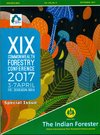Botryosphaeriaceae Fungal Species as Potential Pathogens of Meliaceae in the Arid and Semi-Arid Lands of Kenya
DOI:
https://doi.org/10.36808/if/2017/v143i9/118892Keywords:
Botryosphaeriaceae, Meliaceae, Disease Tolerance.Abstract
Botryosphaeriaceae are significant and cosmopolitan pathogensworldwide. In Kenya, the fungal family has been reported on Grevillea robusta on-farm. Two Meliaceae tree species, exotic Azadirachta indica (A. Juss.) and indigenous Melia volkensii (Geurke) were sampled across Kenya. Symptoms found in the field included shoot die-back (45%), canker 14%, both canker and dieback (25%) while 16% of the trees sampled were healthy. Botryosphaeriaceae was most prevalent in Melia volkensii mortality rate of 28%. DNA results of the ITS and Tef1-alpha gene region for 86 isolates classified into 6 species of the Botryosphaeriaceae.3 of these species belonged to the genus Lasiodiplodia namely L. pseudotheobromae, L. theobromae and L. parva. This is the first report of species Spencermartinsia viticola and Macrophoma theicola in Kenya. Pathogenicity tests done under glass house conditions showed that the L. pseudotheobromae species was most virulent to both M. volkensii and A. indica while L. theobromae was least virulent to both tree species. Wilting and necrosis was recorded within 7 days of inoculation but wound healing occurred on both species after 12 weeks. This study gave insight into disease resistance and tolerance of these dryland species for plantation establishment. It also revealed wider host diversity for Botryosphaeriaceae in the drylands.References
Agrios G.N. (2005). Plant Pathology, 5th Edition. Elsevier, Academic Press.
Denman P.W., Crous J.E., Taylor J.C., Kang I., Pascoe and Wingfield M.J. (2000) An overview and taxonomic history of Botryosphaeria and a reevaluation of its anamorphs based on morphology and ITS rDNA phylogeny. Studies in Mycology, 45(2000): 129-140.
Njuguna J., Barklund P., Ihrmark K. and Stenlid J. (2011). A canker and dieback disease threatening the cultivation of Grevillea robusta on small scale farms in Kenya. African J. Agricultural Research, 6(3): 748-756.
Phillips A.J.L., Alves A., Abdollahzadeh A., Slippers B., Wingfield M.J., J.Z. Groenewald J.Z., and Crous P.W. (2013). “The Botryosphaeriaceae: genera and species known from culture†Studies in Mycology, 76(1): 51–167.
Slippers B., Crous P.W., Denman S., Courtinho T.A., Wingfield B.D. and Wingfield M.J. (2004a). Combined multiple gene genealogies and Phenotypic characters differentiate several species previously identified as Botryosphaeriadothidea. Mycologia, 96:83-101.
Downloads
Downloads
Published
How to Cite
Issue
Section
License
Unless otherwise stated, copyright or similar rights in all materials presented on the site, including graphical images, are owned by Indian Forester.





